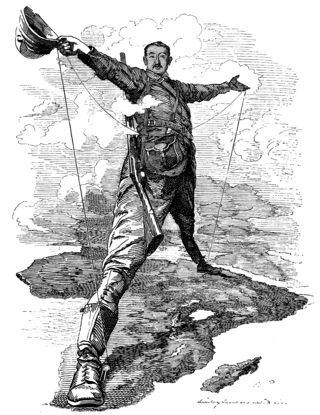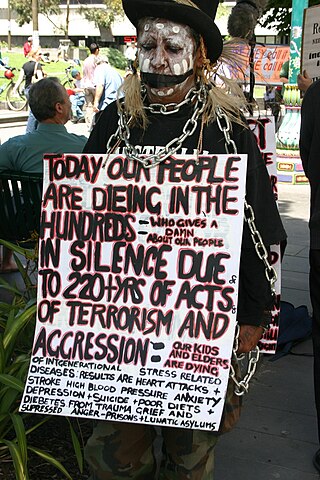Related Research Articles

Colonialism is the establishment and maintenance of one group of people as superior to other peoples and areas, often for imperialist control and exploitation, and through a range of practices and relations of colonization, installing coloniality and possibly colonies. That said there is no clear definition of colonialism and definitions may vary depending on the use of the term and context.

Imperialism is the practice, theory or attitude of maintaining or extending power over foreign nations, particularly through expansionism, employing both hard power and soft power. Imperialism focuses on establishing or maintaining hegemony and a more or less formal empire. While related to the concepts of colonialism, imperialism is a distinct concept that can apply to other forms of expansion and many forms of government.
Colonization is a process of establishing control over specific territories or peoples for the purpose of cultivation, possibly involving settling, the establishment of colonialism, coloniality and colonies.

In historical contexts, New Imperialism characterizes a period of colonial expansion by European powers, the United States, and Japan during the late 19th and early 20th centuries. The period featured an unprecedented pursuit of overseas territorial acquisitions. At the time, states focused on building their empires with new technological advances and developments, expanding their territory through conquest, and exploiting the resources of the subjugated countries. During the era of New Imperialism, the European powers individually conquered almost all of Africa and parts of Asia. The new wave of imperialism reflected ongoing rivalries among the great powers, the economic desire for new resources and markets, and a "civilizing mission" ethos. Many of the colonies established during this era gained independence during the era of decolonization that followed World War II.

The Scramble for Africa was the invasion, colonization, and partition of most of Africa among seven Western European powers during the era of "New Imperialism" (1833–1914). In 1870, 10% of the continent was formally under European control. By 1914, this figure had risen to almost 90%, with only Liberia and Ethiopia retaining their full sovereignty.
Decolonization or decolonisation is the undoing of colonialism, the latter being the process whereby imperial nations establish and dominate foreign territories, often overseas. The meanings and applications of the term are disputed. Some scholars of decolonization focus especially on independence movements in the colonies and the collapse of global colonial empires. Other scholars extend the meaning to include economic, cultural and psychological aspects of the colonial experience.

James Heartfield is a British historian and a lecturer.
The civilizing mission is a political rationale for military intervention and for colonization purporting to facilitate the Westernization of indigenous peoples, especially in the period from the 15th to the 20th centuries. As a principle of Western culture, the term was most prominently used in justifying French colonialism in the late-15th to mid-20th centuries. The civilizing mission was the cultural justification for the colonization of French Algeria, French West Africa, French Indochina, Portuguese Angola and Portuguese Guinea, Portuguese Mozambique and Portuguese Timor, among other colonies. The civilizing mission also was a popular justification for the British and German colonialism. In the Russian Empire, it was also associated with the Russian conquest of Central Asia and the Russification of that region. The Western colonial powers claimed that, as Christian nations, they were duty bound to disseminate Western civilization to what they perceived as heathen, primitive cultures.

European colonialism and colonization is the policy or practice of acquiring full or partial political control over other societies and territories, founding a colony, occupying it with settlers, and exploiting it economically. For example, colonial policies, such as the type of rule implemented, the nature of investments, and identity of the colonizers, are cited as impacting postcolonial states. Examination of the state-building process, economic development, and cultural norms and mores shows the direct and indirect consequences of colonialism on the postcolonial states.

The historical phenomenon of colonization is one that stretches around the globe and across time. Ancient and medieval colonialism was practiced by the Phoenicians, Greeks, Turks, and Arabs.

Dja Dja Wurrung, also known as the Djaara or Jajowrong people and Loddon River tribe, are an Aboriginal Australian people who are the traditional owners of lands including the water catchment areas of the Loddon and Avoca rivers in the Bendigo region of central Victoria, Australia. They are part of the Kulin alliance of Aboriginal Victorian peoples. There are 16 clans, which adhere to a patrilineal system. Like other Kulin peoples, there are two moieties: Bunjil the eagle and Waa the crow.
Postcolonialism is the critical academic study of the cultural, political and economic legacy of colonialism and imperialism, focusing on the impact of human control and exploitation of colonized people and their lands. The field started to emerge in the 1960s, as scholars from previously colonized countries began publishing on the lingering effects of colonialism, developing a critical theory analysis of the history, culture, literature, and discourse of imperial power.
The Aborigines' Protection Society (APS) was an international human rights organisation founded in 1837, to ensure the health and well-being and the sovereign, legal and religious rights of the indigenous peoples while also promoting the civilisation of the indigenous people who were subjected under colonial powers, in particular the British Empire. In 1909 it merged with the British and Foreign Anti-Slavery Society (BFASS) to form the Anti-Slavery and Aborigines' Protection Society.

The historiography of the British Empire refers to the studies, sources, critical methods and interpretations used by scholars to develop a history of the British Empire. Historians and their ideas are the main focus here; specific lands and historical dates and episodes are covered in the article on the British Empire. Scholars have long studied the Empire, looking at the causes for its formation, its relations to the French and other empires, and the kinds of people who became imperialists or anti-imperialists, together with their mindsets. The history of the breakdown of the Empire has attracted scholars of the histories of the United States, the British Raj, and the African colonies. John Darwin (2013) identifies four imperial goals: colonising, civilising, converting, and commerce.

"The Imperialism of Free Trade" is an academic article by John Gallagher and Ronald Robinson first published in The Economic History Review in 1953. The article was influential in the debate concerning the causes of British imperial expansion in the 19th-century which, since John A. Hobson's Imperialism: A Study (1902), had focused on economic motivation. Instead, Gallagher and Robinson claimed that the New Imperialism – "the new spate of imperial expansion that gathered momentum from the 1880s" – could be best characterised as a continuation of a longer-term policy begun in the 1850s in which informal empire, based on the principles of free trade, was favoured over formal imperial control unless circumstances made such rule impossible. As well as reigniting scholarly interest in theorizing New Imperialism, the article helped launch the Cambridge School of historiography.
Christianity and colonialism are often closely associated with each other due to the service of Christianity, in its various sects, as the state religion of the historical European colonial powers, in which Christians likewise made up the majority. Through a variety of methods, Christian missionaries acted as the "religious arms" of the imperialist powers of Europe. According to Edward E. Andrews, Associate Professor of Providence College Christian missionaries were initially portrayed as "visible saints, exemplars of ideal piety in a sea of persistent savagery". However, by the time the colonial era drew to a close in the later half of the 20th century, missionaries were viewed as "ideological shock troops for colonial invasion whose zealotry blinded them", colonialism's "agent, scribe and moral alibi".

Settler colonialism occurs when colonizers invade and occupy territory to permanently replace the existing society with the society of the colonizers.

Nigel John Biggar is a British Anglican priest, theologian, and ethicist. From 2007 to 2022, he was the Regius Professor of Moral and Pastoral Theology at the University of Oxford.
The Parliamentary Select Committee on Aboriginal Tribes, or the Aborigines Select Committee, was a select committee of the Parliament of the United Kingdom.

Zionism and the Israeli–Palestinian conflict have been described as a form of settler colonialism. Patrick Wolfe, an influential theorist of settler colonial studies, considered Israel an example and discussed it in his 2006 essay "Settler colonialism and the elimination of the native". Other scholars who have used a settler-colonial analysis of Israel/Palestine include Edward Said, Rashid Khalidi, Noam Chomsky, Ilan Pappe, Fayez Sayegh, Maxime Rodinson, George Jabbour, Ibrahim Abu-Lughod, Baha Abu-Laban, Jamil Hilal, and Rosemary Sayigh. Many of the fathers of Zionism themselves described it as colonialism, such as Vladimir Jabotinsky who said "Zionism is a colonization adventure".
References
- ↑ profiles.sussex.ac.uk https://profiles.sussex.ac.uk/p114412-alan-lester . Retrieved 15 June 2023.
{{cite web}}: Missing or empty|title=(help) - ↑ "Alan Lester". Alan Lester. Retrieved 2023-06-16.
- ↑ Howe, Stephen, ed. (2020-07-24). The New Imperial Histories Reader. doi:10.4324/9781003060871. ISBN 9781003060871. S2CID 160751035.
- ↑ Lester, Alan (2023). Deny and Disavow: Distancing the Imperial Past in the Culture Wars (2nd ed.). London: SunRise Publishing Limited. ISBN 978-1-9144891-4-3.
- ↑ Lester, Alan (2023-06-02). "The British Empire in the Culture War: Nigel Biggar's Colonialism: A Moral Reckoning". The Journal of Imperial and Commonwealth History. 51 (4): 763–795. doi: 10.1080/03086534.2023.2209947 . ISSN 0308-6534. S2CID 259061156.
- ↑ Clayton, Daniel (2003). "Reviews: Imperial Networks: Creating Identities in Nineteenth-Century South Africa and Britain". Environment and Planning A: Economy and Space. 35 (1): 189–190. Bibcode:2003EnPlA..35..189C. doi:10.1068/a3501rvw. ISSN 0308-518X. S2CID 157397798.
- ↑ Keegan, Timothy (2002). "COMPETING COLONIAL DISCOURSES Imperial Networks : Creating Identities in Nineteenth-Century South Africa and Britain. By A LAN L ESTER . London and New York: Routledge, 2001. Pp. xii+257. £55; $90 ( ISBN 0-415-19850-X); £16.99; $27.95, paperback ( ISBN 0-415-25914-2)". The Journal of African History. 43 (2): 313–376. doi:10.1017/S0021853702388297. S2CID 162537782.
- ↑ Potter, Simon J. (2007). "Webs, Networks, and Systems: Globalization and the Mass Media in the Nineteenth- and Twentieth-Century British Empire". Journal of British Studies. 46 (3): 621–646. doi:10.1086/515446. S2CID 145304674.
- ↑ Anderson, Peter (2004). "Review of Imperial Networks: Creating Identities in Nineteenth-Century South Africa and Britain". Kronos (30): 247–249. ISSN 0259-0190. JSTOR 41056527.
- ↑ McHugh, P.G. (2016). "Colonization and the Origins of Humanitarian Governance: Protecting Aborigines across the Nineteenth-Century British Empire, by Alan Lester and Fae Dussart". The English Historical Review. 131 (553): 1544–1546. doi:10.1093/ehr/cew337.
- ↑ Exeter, CIGH (4 November 2015). "Colonization and the Origins of Humanitarian Governance". Imperial & Global Forum. Retrieved 15 June 2023.
- ↑ Forth, Aidan (2016). "Review of Colonization and the Origins of Humanitarian Governance: Protecting Aborigines across the Nineteenth-Century British Empire". Victorian Studies. 58 (4): 756–758. doi:10.2979/victorianstudies.58.4.23. ISSN 0042-5222. JSTOR 10.2979/victorianstudies.58.4.23.
- ↑ Exeter, CIGH (12 July 2022). "Hanley on Lester's Deny & Disavow: Distancing the Imperial Past in the Culture Wars (2022)". Imperial & Global Forum. Retrieved 15 June 2023.